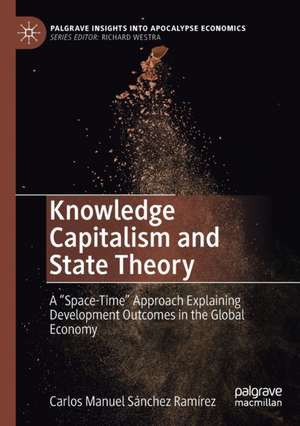Knowledge Capitalism and State Theory: A “Space-Time” Approach Explaining Development Outcomes in the Global Economy: Palgrave Insights into Apocalypse Economics
Autor Carlos Manuel Sánchez Ramírezen Limba Engleză Paperback – 19 apr 2022
| Toate formatele și edițiile | Preț | Express |
|---|---|---|
| Paperback (1) | 720.85 lei 6-8 săpt. | |
| Springer International Publishing – 19 apr 2022 | 720.85 lei 6-8 săpt. | |
| Hardback (1) | 725.26 lei 6-8 săpt. | |
| Springer International Publishing – 19 apr 2021 | 725.26 lei 6-8 săpt. |
Preț: 720.85 lei
Preț vechi: 879.08 lei
-18% Nou
Puncte Express: 1081
Preț estimativ în valută:
137.93€ • 144.01$ • 114.16£
137.93€ • 144.01$ • 114.16£
Carte tipărită la comandă
Livrare economică 04-18 aprilie
Preluare comenzi: 021 569.72.76
Specificații
ISBN-13: 9783030714130
ISBN-10: 3030714136
Ilustrații: XIII, 170 p. 36 illus.
Dimensiuni: 148 x 210 mm
Greutate: 0.25 kg
Ediția:1st ed. 2021
Editura: Springer International Publishing
Colecția Palgrave Macmillan
Seria Palgrave Insights into Apocalypse Economics
Locul publicării:Cham, Switzerland
ISBN-10: 3030714136
Ilustrații: XIII, 170 p. 36 illus.
Dimensiuni: 148 x 210 mm
Greutate: 0.25 kg
Ediția:1st ed. 2021
Editura: Springer International Publishing
Colecția Palgrave Macmillan
Seria Palgrave Insights into Apocalypse Economics
Locul publicării:Cham, Switzerland
Cuprins
Chapter 1. Introduction: Revisiting State theory in Knowledge Capitalism after markets failure and pandemic crisis through a space – time approach.- Chapter 2. The socio – space – time relativity of the State.- Chapter 3. Long – term cyclicality of capitalism as State time dimension.- Chapter 4. Finland, the Innovate State.- Chapter 5. China, the visible hand of the State.- Chapter 6. Brazil and Argentina: Hegemonic crisis, neo – developmental State and wasted decade.- Chapter 7. Post – pandemic COVID – 19 World Order: decline of neoliberalism and strike back of the State? A reading from Gramsci.- Chapter 8. Conclusion: New Cold War as post – pandemic COVID – 19 World Order?
Notă biografică
Carlos M. Sánchez Ramírez is Professor of International Economics, World Economic Structure and Economic Integration at the National University of Mexico. He is the author of Mexico in Knowledge Economy: Conditions and Challenges of its 32 States in the New Capitalism Phase of Development. In 2014, he was awarded the National Research Award by National University of Mexico, PricewaterhouseCoopers Mexico, and Interacciones Financial Group.
Textul de pe ultima copertă
The book builds on an important emergent body of discussion which questions, both empirically and theoretically, the conventional neoclassical doctrine that economies are more efficient if the state withdraws from it. It develops a “space-time” approach to state theory as a way of explaining development outcomes in the global economy as the latter increasingly shifts to what is referred to as “knowledge capitalism”. It examines two global cases – Finland and China – as expressions of two broad models of successful development punctuated most recently by successful responses to the Covid-19 pandemic. It also contrasts both cases with the unsuccessful development of Brazil and Argentina toward “knowledge capitalism” and the ramifications of that for their efforts to combat Covid-19. This book will be of interest to academics in economics, politics and international relations.
Carlos M. Sánchez Ramírez is Professor of International Economics, World Economic Structure and Economic Integration at the National University of Mexico. He is the author of Mexico in Knowledge Economy: Conditions and Challenges of its 32 States in the New Capitalism Phase of Development. In 2014, he was awarded the National Research Award by National University of Mexico, PricewaterhouseCoopers Mexico, and Interacciones Financial Group.
Caracteristici
Provides an original contrast between Finland and post-reform China as two “statist” models of sorts, woven around a novel approach to state theory. Develops and deepens discussion on the virtuous effects of state-led innovation and state-led development. Develops a “space-time” approach to state theory as a way of explaining development outcomes in the global economy as the latter increasingly shifts to what is referred to as “knowledge capitalism”.












